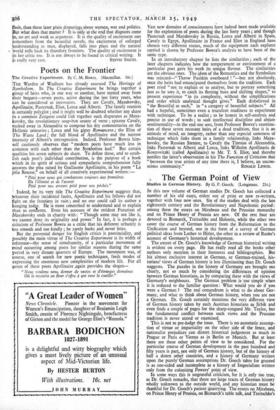Poets on the Frontier.
(The Creative Experiment. By C. M. Bowra. (Macmillan. 16s.) ,.THE Warden of Wadham has already assessed The Heritage of Symbolism. In The Creative Experiment he brings together a group of heirs who, in one way or another, have hurled away from their bequest—seven poets, active during the last fOrty years, who can be considered as innovators. They. are CavafY, Mayakovsky, iApollinaire, Pasternak, Eliot, Lorca and Alberti. The family reunion is certainly polyglot ; and it might well be doubted whether any share in a common Zeitgeist could link together such disparates as Maya- kovsky, the revolutionary soap-box orator of verse ; epicene Cavafy, tucked away in Alexandria to compose his dry commentaries on the ilellenic centuries ; Lorca and his gipsy Romancero ; the Eliot of l'he Waste Land ; the full blood of Apollinaire and the narrow intensity of Alberti's introspection. Indeed, Professor Bowra him- self cautiously observes that " modern poets have much less in common with each other than the Symbolists had." But certain qualities his seven subjects do share. To define these, and to estab- lish each poet's individual contribution, is the purpose of a book !which in its spirit of serious and sympathetic comprehension fully answers the plea raised by Guillaume Apollinaire, in his poem " La jolie Rousse," on behalf of all creatively experimental writers : -
" Pule pour nous qui combattons toujours aux frontieres De l'illimite et de l'avenir
Pule pour nos erreurs pitie pour nos peches."
' Indeed, by its very title The Creative Experiment suggests that, 'phatever their incidental faults, Apollinaire and his fellows did not fight on the frontiers in vain ; and no one could call its author a ganging judge. He is more concerned to understand and to explain than to condemn. Even his account of the strident Futurism of Mayakovsky ends in charity with : " Though some may not like it, we cannot deny, its originality and power." In fact, it is perhaps a criticism of Professor Bowra as a critic that his deferent urbanity is too smooth and too kindly ; he rarely barks and never bites. But the perennial danger for English critics is provinciality, and possibly the main virtue of The Creative Experiment is its width of treference—the sense of simultaneity, of a particular movement of 'ind occurring among poets for similar reasons during the same period in very distant quarters of Europe. The movement was, of course, one of search for new poetic techniques, fresh modes of expressing the enormous new complexities of modern life. For all t,even of these poets Apollinaire Again provides the slogan- " Nous voulons nous donner de vaster et --d'etranges domaines Oft le mystere en fleur s'offre a qui veut le cueillir."
Vast new domains of consciousness have indeed been made available for the exploration of poets during the last forty yeara ; and though Pasternak and Mayakovsky in Russia, Lorca and Alberti in Spain, Cavafy in Egypt, Apollinaire in France and Eliot in England have chosen very different routes, much of the equipment each explorer carried is shown by Professor Bowra's analysis to have been of the Same type.
In an introductory chapter he lists the similarities ; each of the later chapters indicates how the temperament or environment of a particular poet gaVe his work its unique flavour. The similarities are the obvious ones. The iclom of the Romantics and the Symbolists was rejected—" Throw Pushkin overboard ! "—but not absolutely, once the heirs had emancipated themselves from the tradition. Each poet tried " not to explain or to analyse, but to portray something just as he sees it, to catch its fleeting hues and shifting shapes," to present experience " in its complexity, without the simplifications and order which analytical thought gives." Each disbelieved in " the Beautiful as such," in " a category of beautiful subjects." Ali had a hopeful, sometimes even a truculent readiness to experiment with technique. To be a realist ; to be honest in self-analysis and precise in use of words ; to seek intellectual discipline and abjure sentimentality—in the end one sees, from Professor Bowra's examina- tion of these seven recusant heirs of a dead tradition, that it is an attitude of mind, an integrity, rather than any especial sameness of technique which links them in a family relationship, links Maya- kovsky, the Russian Stentor, to Cavafy the Tiresias of. Alexandria, links Pasternak to Alberti and Lorca, links Wilhelni Apollinafis de Kostrovitzki (called Apollinaire) to Mr. T. S. Eliot; and thereby justifies the latter's observation in his The Function of Criticism that " between the true artists of any time there is, I believe, an uncon-














































 Previous page
Previous page